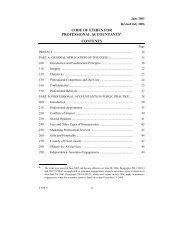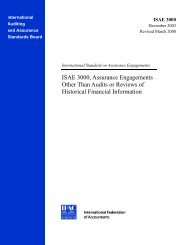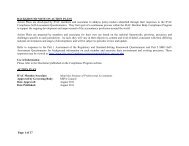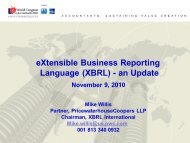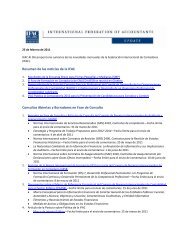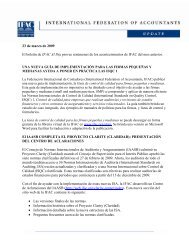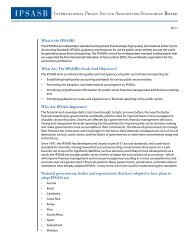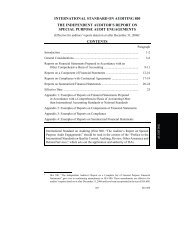ipsas 29—financial instruments: recognition and measurement - IFAC
ipsas 29—financial instruments: recognition and measurement - IFAC
ipsas 29—financial instruments: recognition and measurement - IFAC
Create successful ePaper yourself
Turn your PDF publications into a flip-book with our unique Google optimized e-Paper software.
FINANCIAL INSTRUMENTS: RECOGNITION AND MEASUREMENT<br />
“Revenue from Non-Exchange Transactions (Taxes <strong>and</strong> Transfers).” IPSAS 23<br />
does not provide requirements <strong>and</strong> guidance for the subsequent <strong>measurement</strong> or<br />
de<strong>recognition</strong> of these assets <strong>and</strong> liabilities. The IPSASB considered the<br />
interaction between this St<strong>and</strong>ard <strong>and</strong> IPSAS 23 for assets <strong>and</strong> liabilities that<br />
arise out of non-exchange revenue transactions that meet the definition of<br />
financial assets <strong>and</strong> financial liabilities.<br />
BC6. The IPSASB agreed that where an asset acquired in a non-exchange<br />
transaction is a financial asset, an entity:<br />
• Initially recognizes the asset using IPSAS 23; <strong>and</strong><br />
• Initially measures the asset using IPSAS 23 <strong>and</strong>, considers the<br />
requirements in this St<strong>and</strong>ard to determine the appropriate treatment<br />
for any transaction costs incurred to acquire the asset.<br />
As IPSAS 23 does not prescribe subsequent <strong>measurement</strong> or de<strong>recognition</strong><br />
requirements for assets acquired in a non-exchange transaction, this St<strong>and</strong>ard is<br />
applied to those assets if they are financial assets.<br />
BC7. For liabilities, the IPSASB agreed that liabilities arising from conditions<br />
imposed on a transfer of resources in accordance with IPSAS 23 are initially<br />
recognized <strong>and</strong> initially measured using that IPSAS, as these liabilities usually<br />
do not meet the definition of a financial liability at initial <strong>recognition</strong> (see<br />
IPSAS 28). After initial <strong>recognition</strong>, if circumstances indicate that the liability is<br />
a financial liability, an entity assesses if the liability recognized in accordance<br />
with IPSAS 23 should be derecognized <strong>and</strong> a financial liability recognized in<br />
accordance with this St<strong>and</strong>ard.<br />
BC8. The IPSASB agreed that other liabilities that arise from non-exchange revenue<br />
transactions, for example, the return of resources based on a restriction on the<br />
use of an asset, are recognized <strong>and</strong> measured in accordance with this St<strong>and</strong>ard if<br />
they meet the definition of a financial liability.<br />
Initial Measurement<br />
BC9. The IPSASB acknowledged that there is an interaction between IPSAS 23<br />
<strong>and</strong> this St<strong>and</strong>ard for assets acquired through a non-exchange transaction that<br />
also meet the definition of a financial asset. IPSAS 23 requires that assets<br />
acquired in a non-exchange revenue transaction are measured initially at fair<br />
value. This St<strong>and</strong>ard requires financial assets to be measured initially at fair<br />
value, plus transaction costs, if the asset is not subsequently measured at fair<br />
value through surplus or deficit. The two <strong>measurement</strong> approaches are<br />
broadly consistent, except for the treatment of transaction costs.<br />
BC10. The IPSASB concluded that it would be inappropriate for financial assets<br />
arising from non-exchange transactions to be measured differently from those<br />
arising from exchange transactions. Consequently, the IPSASB agreed that<br />
assets acquired in a non-exchange transaction should be measured initially at<br />
1153<br />
IPSAS 29 BASIS FOR CONCLUSIONS<br />
PUBLIC SECTOR


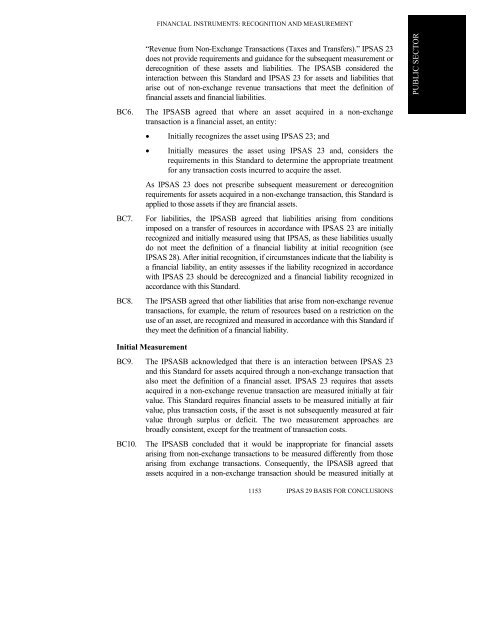
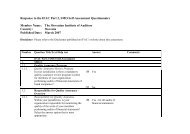
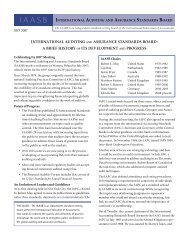
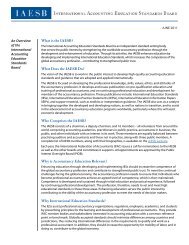
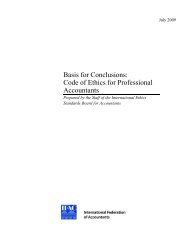
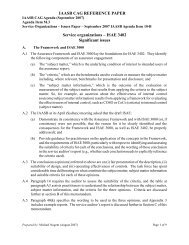
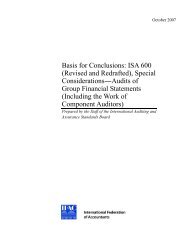
![International Auditing and Assurance Standards Board [IAASB] - IFAC](https://img.yumpu.com/22522144/1/190x245/international-auditing-and-assurance-standards-board-iaasb-ifac.jpg?quality=85)
